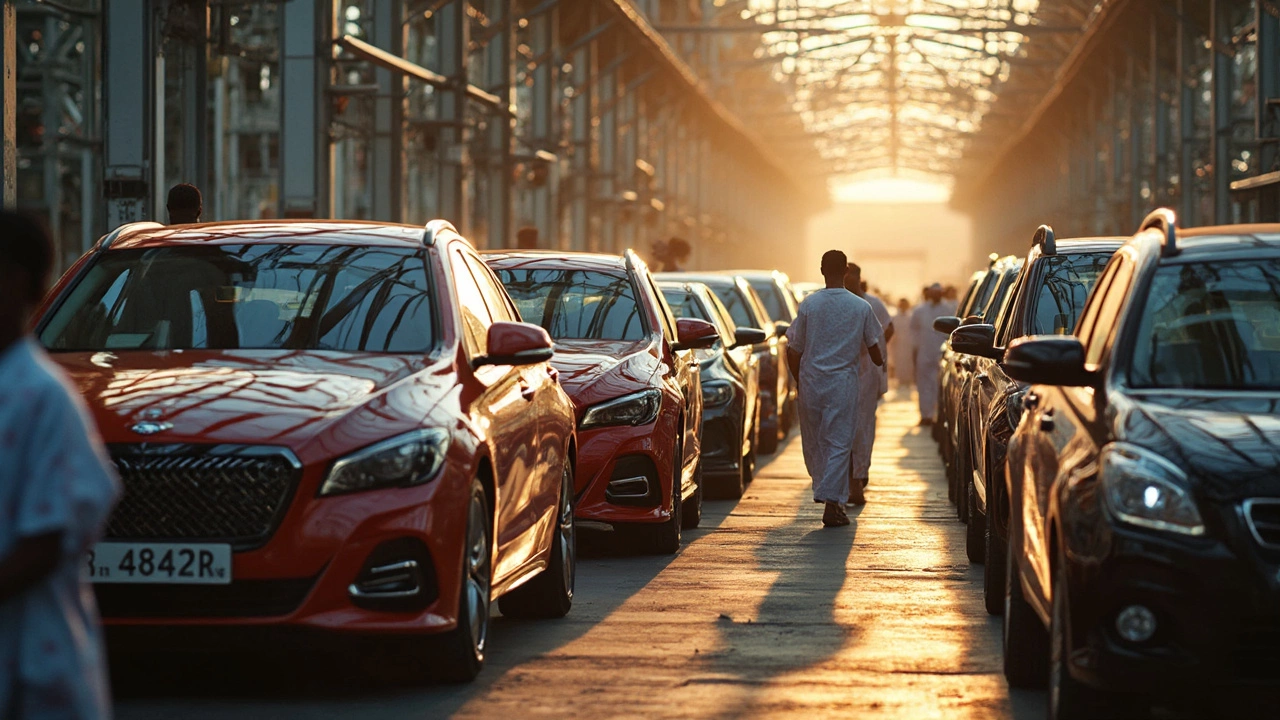When you think of car manufacturing, Nigeria isn't exactly the first place that pops into mind. Yet, this African nation is slowly making a name for itself in the auto industry. Wonder which car brands are waving the 'Made-in-Nigeria' flag? Let's explore.
Believe it or not, quite a few global carmakers have ventured into Nigeria. Companies like Honda and Peugeot have been around for a while, assembling some models to cater to the local market. It's not just about importing ready-made vehicles anymore. Nope, the game has changed, with CKD (completely knocked down) kits being assembled right there in Nigerian factories.
Now, why is this happening? One key player in this shift is the Nigerian government. They're putting policies in place to boost local manufacturing, aiming to reduce reliance on imported vehicles. This push is creating jobs, boosting the economy, and offering Nigerians more affordable options for getting behind the wheel of a new car.
But it ain't all smooth roads. Automakers in Nigeria face a unique set of challenges, from inconsistent power supply to tough economic conditions. Yet, they keep rolling with the punches, pushing for a place on the global automotive map. So, the next time you see a car on the streets of Lagos, remember—it might just be made in Nigeria.
- Nigeria's Automotive History
- Famous Car Brands in Nigeria
- Local Manufacturing Efforts
- Government Policies Impact
- Economic and Social Implications
- Challenges in Nigeria's Auto Industry
Nigeria's Automotive History
Diving into Nigeria's automotive story is like turning the pages of a history book that's been full of ups and downs. It all began in the 1970s when the Nigerian government, aiming to boost industrialization, decided that setting up vehicle assembly plants was the way to go. Pugeot and Volkswagen are some of the foreign brands that tapped into the Nigerian vibe by setting up shop there.
During those early days, the Nigerian auto industry saw some real action with lots of excitement around expanding local assembly lines. But, fast forward a couple of decades, and you hit a major speed bump. Economic troubles, policy shifts, and the political climate struck a hard blow on these efforts. Most of those early auto plants closed shop by the 1990s.
But it wasn't all doom and gloom. In recent years, there's been a turnaround with more assembly lines reopening. Local manufacturers are testing their wheels, alongside new partnerships with brands like Innoson Vehicle Manufacturing, aiming to become local heroes in the auto scene.
The government remains a pivotal player, trying to lure foreign investments by sweetening the deal with incentives and policies aimed to revive this cherished industry. The goal? To introduce more made-in-Nigeria cars back to the road. Despite challenges, this renewed focus might just drive Nigeria's automotive narrative into a more promising chapter.
Famous Car Brands in Nigeria
Think of Nigeria, and you might not immediately picture car factories, but there's a whole lot going on under the hood. Some pretty major players have set up shop here, starting with Peugeot. The company's been in Nigeria for decades, and it’s got a plant in Kaduna churning out vehicles like the 301 model. Peugeot’s presence is like a legacy, symbolizing the early days of Nigeria’s car manufacturing ambitions.
Then there’s Honda, known worldwide, but did you know they've got a place here in Nigeria too? They assemble cars and motorcycles, specifically for the local market. It’s amazing seeing these big brands putting down roots in Nigeria’s fertile automotive ground.
Let’s not forget about Stallion Group, which handles a variety of brands under its umbrella. They’re linked up with brands like Hyundai, Nissan, and even Volkswagen, assembling vehicles locally. This local assembly helps bring down the costs while boosting availability.
To paint a clearer picture, here’s a peek at some notable brands and their Nigerian endeavors:
| Brand | Model Assembled | Location |
|---|---|---|
| Peugeot | 301, 508 | Kaduna |
| Honda | Civic, Accord | Ogun |
| Hyundai | i10, Grand i10 | Lagos |
These companies aren’t just importing components to slap together a car; they’re investing in local talent and infrastructure. Beyond just selling cars, car brands in Nigeria are creating jobs and contributing to the community's economic growth.
Although challenges like infrastructure and power supply can make this process less smooth, the benefits are clear. Doing business in Nigeria might come with its speed bumps, but the road ahead looks promising for these carmakers. With plans to expand and enhance local assembly lines, Nigeria's role in the global car industry is revving up.
Local Manufacturing Efforts
Alright, so here's the scoop on Nigerian auto industry and their local manufacturing efforts. One of the major players in this space is Innoson Vehicle Manufacturing (IVM), an indigenous company that's gaining traction. They roll out vehicles right in Nigeria, and they've got everything from buses to trucks and even sedans. Innoson models, for example, have become pretty popular for government and public institutions due to their affordability and customization options.
Aside from Innoson, global giants like Peugeot and Honda have been setting up shop in Nigeria through joint ventures and assembly plants. Peugeot, for instance, operates through PAN Nigeria Ltd. This collaboration has been steadily producing cars, ensuring that local consumers have options that cater to their specific needs and preferences.
Now, what fuels all this local production? It's the Nigerian government's auto policy, aimed at cutting back on vehicle imports while jacking up local production. This involves higher tariffs on imported cars, making it way more affordable to choose something that’s assembled locally.
Let's take a look at some numbers. According to recent data, the local production capacity is expected to rise as these initiatives gain momentum. Manufacturers are currently focusing on producing vehicles that can withstand Nigeria's rough terrains, which is a huge plus for local buyers.
However, not every plan works out without a hitch. These manufacturers are pulling double duty to tackle hurdles like inconsistent power supply and infrastructure challenges. Still, the optimism is palpable as made-in-Nigeria initiatives gradually take root.
Here's to hoping that one day, Nigeria will be a car manufacturing hub in the truest sense, leading to even more job opportunities and economic growth.

Government Policies Impact
When it comes to the auto industry in Nigeria, the government's role is like the engine in a car—without it, nothing moves. Understanding the significant impact of government policies is crucial to grasp why some car brands are now popping up with a 'Made-in-Nigeria' tag.
In 2013, the Nigerian government rolled out the National Automotive Industry Development Plan (NAIDP), aiming to boost local production. This policy covers everything from assembly to production incentives for companies willing to set up shop in Nigeria. It was a bold step to reduce dependency on car imports and build a self-sustaining auto industry.
The idea was simple: offer tax breaks, lots of them, and encourage foreign and local investors to dive into Nigerian auto industry. The tax holidays are a big draw for manufacturers. Plus, additional customs duty rebates make importing those CKD kits way less painful on the pocket.
- Tax holidays: Manufacturers get a few years off on certain taxes, which keeps the costs down.
- Duty downplays: Reduced import duties on machinery and equipment encourage setting up local assembly plants.
- Loan schemes: Financial support is available for serious manufacturers wanting to invest in local assembly plants.
So, what's the game result? Car brands like Innoson Vehicle Manufacturing have made significant strides, and even big players like Peugeot have set up assembly lines. Perhaps the most exciting part is seeing how these policies generate local jobs and lead to a skilled workforce.
However, it's not all sunshine and rainbows. Some policies have faced criticism. Critics argue that import restrictions have inflated car prices, putting a brand-new car out of reach for many Nigerians. But despite the hiccups, the mission to bolster local automotive production keeps chugging along.
Economic and Social Implications
Alright, so what's the big deal about local manufacturing in Nigeria's car industry? When cars get made or assembled locally, it creates a ripple effect that's pretty significant for the economy and social landscape. Let's break it down.
Firstly, assembling cars in Nigeria is a job creator. We're not talking just a few positions here and there; we're talking thousands of jobs. When global brands go for local vehicle manufacturing, they set up plants, hire local workers, and train them. This means skill development and a boost in employment, which is a win-win.
Then there's the matter of economic growth. Local car assembly means less reliance on imported vehicles, conserving foreign exchange. Plus, it invites investment into Nigeria, both from the car companies and the associated industries like parts supply. It's like a chain reaction of economic benefits!
Think about the ripple effect this has. More jobs and skills can lead to improved living standards. People have more money to spend, supporting their families and communities. Moreover, having a thriving Nigerian auto industry can even pave the way for the country to later export these vehicles, placing Nigeria on the global auto map.
Socially, local manufacturing can foster a sense of pride. Owning a car that was assembled right in your backyard creates a different connection. It inspires confidence in local capabilities and can inspire young minds to consider careers in engineering or manufacturing. Not to mention, more affordable vehicles might mean more people can afford to own cars, impacting mobility and lifestyle.
Of course, it's not without challenges. Complexities in infrastructure, policy execution, and fluctuating economic conditions pose real hurdles. Yet, these challenges can push innovation and creative problem-solving.
Ultimately, made-in-Nigeria cars are more than just vehicles; they're a beacon of growth and potential for a nation on the rise.
Challenges in Nigeria's Auto Industry
Diving into the world of automobile manufacturing Nigeria-style, you'd find it's not all smooth sailing. So, what are these stumbling blocks, and how do they impact car brands in Nigeria?
First off, there's the notorious issue with power supply. Yep, it’s not just a meme—the electricity situation can be a real headache. Imagine trying to assemble a car when, bam, the lights go out. This instability forces manufacturers to rely heavily on generators, shooting up costs and affecting production efficiency.
Then there's the elephant in the room: import tariffs and duties. While the government has policies promoting local manufacturing, the high tariffs on imported car parts and machinery can sometimes feel like a double-edged sword. The costs trickle down to consumers, making locally assembled vehicles not as cheap as you'd expect compared to their imported counterparts.
Something else to chew on is the infrastructural lag. Roads that lead to production hubs? Often not in the best shape. This makes transporting materials and finished products a hassle, delaying timelines, and increasing logistics costs.
And let's not forget about economic fluctuations. The Naira's unpredictable value against other currencies can affect the price of imported materials, impacting the overall cost structure. This keeps manufacturers of made-in-Nigeria cars on their toes in the money game.
Also, there’s a need for skilled labor. While the potential workforce is massive, there's a gap in technical expertise necessary for modern auto manufacturing processes. This sometimes results in hiring expats, which again, isn't cheap and can hinder knowledge transfer and local talent growth.
In a nutshell, while Nigeria's ambition to be a key player in the auto industry is strong, the path is riddled with challenges that require innovative solutions and patience from all stakeholders involved.





